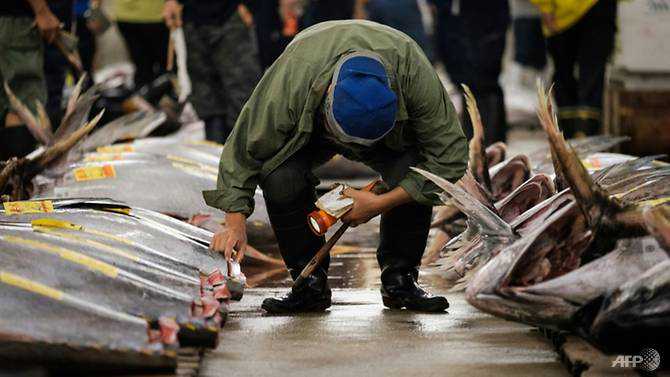Tokyo's Tsukiji holds last tuna auction before move
06 October, 2018

Tokyo fishmongers gathered before dawn Saturday (Oct 6) for one final tuna auction at the world-famous Tsukiji market before it closes its doors and moves to a new site.
It was an emotional moment for veterans of the market, which many acknowledge is now too rundown to support its mammoth operations but has been the beating heart of Tokyo's culinary scene for decades.
"I'm almost crying," said Hisao Ishii, a retired seafood auctioneer who was back at the market for its final day.
"Today is a sad day of goodbyes. Tsukiji tried to meet the times, but it is getting older," the 68-year-old told AFP.
"I came here today to tell Tsukiji thank you and goodbye."
In the weak early-morning sun, traders filed into a warehouse for the final tuna auction, an indispensable ritual in Tokyo's culinary world, and a major tourist draw.
Hundreds of fresh and frozen tuna tagged with their weight and ports of origin were laid out in lines in a refrigerated warehouse, and veteran buyers in rubber boots quietly inspected the wares.
They rubbed slices between their fingers and shone torches into the insides of the fish, swapping information with rivals before the showdown began.
An auctioneer shouts out during the final tuna auction at Tokyo's Tsukiji fish market, which is closing its doors and relocating to a more modern complex AFP/Nicolas Datiche
At 6am sharp, handbells rang to signal the auction was under way and the air filled with the sound of auctioneers yelling prices at buyers, who raised fingers to indicate interest.
Tsukiji's tuna auctions have regularly produced eye-watering prices, including a record 155.4 million yen (US$1.8 million) paid for a 222-kilogramme bluefin in 2013. The top price for Saturday's auction was to be announced later in the day.
"PASS THE BATON"
Takeshi Yoshida, a fish wholesaler, said Tsukiji had left "its mark on history" but it was time to "pass the baton".
After Saturday's final day of operations, Tsukiji's inner market will move to Toyosu, a site in eastern Tokyo, where operations will begin on October 11.
The move has been in the works for years, prompted by the dilapidated state of Tsukiji.
Hundreds of fresh and frozen tuna tagged with their weight and ports of origin were laid out in lines as veteran buyers in rubber boots quietly inspected the wares AFP/Nicolas Datiche
Wholesalers have raised concerns about the antiquated facility's earthquake resistance, sanitation and fire safety, as well as the structure's use of asbestos and its crumbling walls.
And the crowds of tourists who have mobbed the market, including groups who lined up for hours to win one of just 120 spots for the tuna auction, have irked wholesalers by interfering with the actual business of Tsukiji.
The new site will feature state-of-the-art refrigeration and confine throngs of tourists to special galleries behind glass.
But the move has proved controversial because of a row over pollution and opposition to the loss of Tsukiji's globally recognised brand.
Tokyo Governor Yuriko Koike was forced to delay the move after a series of problems at Toyosu, formerly home to a gas plant, including soil and groundwater contamination.
The local government paid hundreds of millions of dollars to clean up the new facility and Koike took the final decision to move the market in late 2017, ending years of delays.
"HOPES AND FEARS"
The move affects not only the market's famed fishmongers, but also fruit and vegetable vendors, restaurants and other shops in the inner market.
"I feel nostalgic as Tsukiji has been my home ground for 15 years. We are sad to lose the Tsukiji brand," vegetable wholesaler Tsukasa Kujirai told AFP.
Tsukiji's tuna auctions have regularly produced eye-watering prices, including a record 155.4 million yen ($1.8 million) paid for a 222-kilogramme bluefin in 2013 AFP/Nicolas Datiche
He acknowledged the need for a move but said he was torn between "hopes and fears" about the new site.
The final day of the market looked much like any other in the decades since it opened on the site.
Cars and small "turret trucks" used by vendors whizzed along the roads around the market, which was full of buyers.
The so-called outer market, with brick-and-mortar shops selling everything from seaweed to coffee, will remain after the move.
But the warehouses that housed vendors and additional shops and restaurants are expected to be levelled to make way, initially, for a transport depot for the 2020 Olympic Games.
Beyond that, Koike has suggested the site could be transformed into a kind of culinary theme park, commemorating the market's colourful history.
TAG(s):
